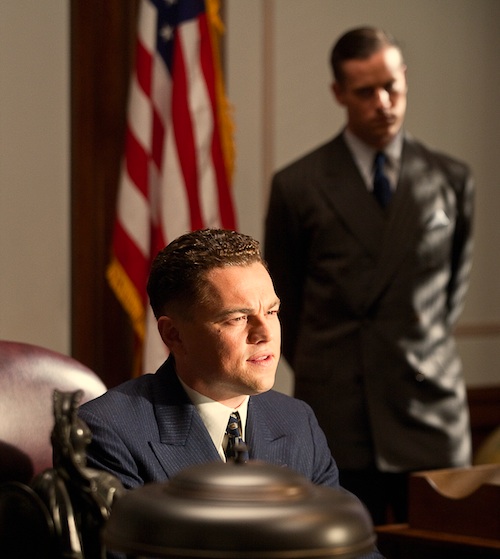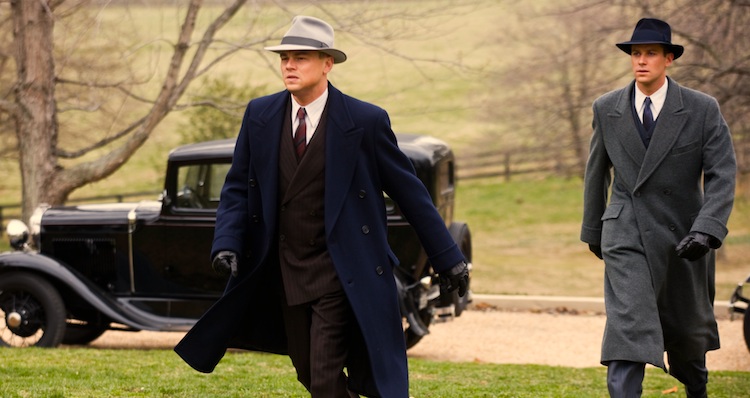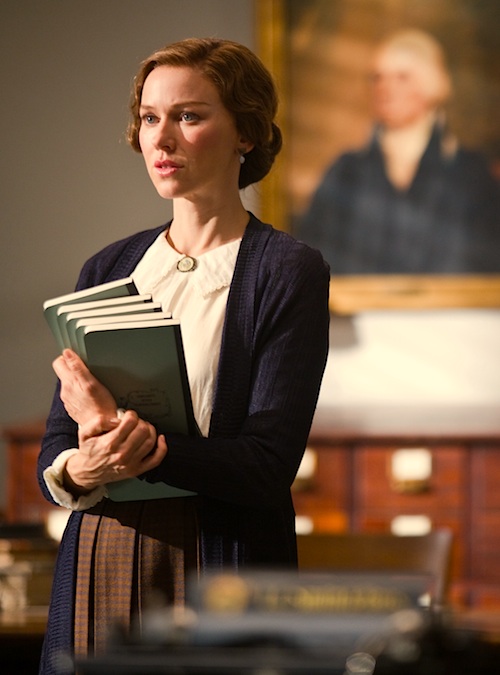
By Jason Apuzzo. THE PITCH: Director Clint Eastwood and star Leonardo DiCaprio bring the colorful and controversial life of legendary FBI director J. Edgar Hoover to the big screen, in a sprawling and complex biopic covering some 50+ years of American domestic history.
THE SKINNY: Eastwood’s relaxed, naturalistic directing style combines with a charismatic performance from DiCaprio to create a mostly sympathetic portrait of Hoover, albeit one that traffics in shopworn clichés of ‘50s anti-communist ‘paranoia’ and Kinsey-style sexual repression. J. Edgar bites off far more history than it can chew in 2 1/2 hours, however, and suffers mightily from its slow pace.
WHAT WORKS: • Leonardo DiCaprio has finally begun to hit his stride as an actor, delivering a voluble, eccentric take on Hoover – treating him as a dapper, genial workaholic with an occasional tendency to overstep his bounds. DiCaprio’s enthusiasm for the character is palpable, however, and mitigates the film’s sporadic tendency to belittle Hoover’s accomplishments.
• Eastwood’s direction softens some of the sharp edges in Dustin Lance Black’s script, keeping the focus on the characters rather than on Oliver Stone-style political showboating. Ideologues of both the left and right will not get out of J. Edgar what they want; the film is much more a Citizen Kane-style character study (complete with flashback structure) than a referendum on the anti-communist cause or the legacy of the FBI and its methods. The film is far too fond of Hoover to be considered left wing, yet too ambivalent toward Hoover’s politics to be considered right wing.
• The question of Hoover’s sexuality is broached tastefully, basically depicting him as too tightly wound for relationships of any kind. In fact, throughout the entire film he receives a grand total of one kiss – forced on him awkwardly by his friend, Clyde Tolson. As presented in the film, Hoover’s greatest passion is quite obviously his work.
• J. Edgar otherwise features strong supporting performances by Armie Hammer as Hoover’s colleague and companion Clyde Tolson, Naomi Watts as Hoover’s long-suffering secretary Helen Gandy, and Judi Dench as Hoover’s mother – the steel in J. Edgar’s spine.

WHAT DOESN’T WORK: • Easily J. Edgar’s biggest problem is its pace. The film plays out like an autumnal jazz piece from Dave Brubeck, rather than as a fast-paced, James Cagney/Warner Brothers-style crime thriller in the vein of The Public Enemy or G-Men – clips of which actually appear in the film. J. Edgar is highly episodic and rarely achieves any momentum.
• The film’s politics are interesting, but ultimately muddled – and one gets the sense that sensitive matters such as Hoover’s relationship to MLK or the Kennedys shouldn’t have been broached without a lot more context being provided. J. Edgar simply bites off more history than it can chew – something that also slows the film down.
• The most important quality J. Edgar lacks is pizzazz. Ultimately it’s hard to understand why Eastwood went through the trouble to pack all this history and political controversy into a tight, $35 million budget if he wasn’t going to have more fun with it – or make more of a statement.

THE BOTTOM LINE: Not unlike Hoover himself, Clint Eastwood has been a part of our public life for over five decades – a kind of national institution – and also like the famous FBI director, Eastwood has had to chart his career against the backdrop of ever-shifting public tastes and values. This is another way of saying that Eastwood, like Hoover, has been a survivor. As J. Edgar presents it, the most important person in Hoover’s life was his mother. Why? Because she taught him to survive, to remain strong in a world of ever-changing villains (communists, the mob, extortionists, etc.). This is ultimately the aspect of Hoover’s character that Eastwood seems most interested in – a not altogether surprising interest for a child of the Depression, as Eastwood is.
Eastwood, a former mayor, has spent a lot of time in his career depicting law enforcement agents – most notably, one Harry Callahan of the San Francisco Police Department – and one senses that J. Edgar may in some sense be his valedictory statement on that subject. J. Edgar expresses an admiration for Hoover the man, but an undisguised ambivalence toward the intrusions of investigative surveillance. My hunch is that Eastwood is very much in the political center on this subject, speaking for a large sector of the public that admires our law enforcement agents – while doubting the need for, say, the intrusive poking and prodding we experience at our nation’s airports. J. Edgar feels most alive and contemporary when it explores this whole question of investigative ‘overreach’ – a question with complex ramifications today that defy easy classification along left wing/right wing lines.
At the same time, I can’t say J. Edgar as a film is a lot of fun – the way Clint’s old films like Dirty Harry, Magnum Force or The Gauntlet used to be. Somehow back in the old days, Clint was able to slip in his civics lessons in the midst of cathartic, funny, thrill-packed stories with colorful characters and quotable lines (“Make my day,” “Do you feel lucky?” etc.). J. Edgar seems like a chore by comparison, a sluggish history lesson begging to be brought to life with vivid villains and a hard-ass, Elliot Ness-style hero. Clint’s old mentor Don Siegel (The Killers, Coogan’s Bluff, Dirty Harry) would’ve known exactly what to do with a story like this: namely, cut about 45 minutes out of it, including any scene in which characters are sitting down. Like its central character, J. Edgar is a film with a good heart, and a lot going on in its head, but its hero really needs to get out of the office more and make a few arrests. I can’t believe 50 years of crime fighting was so dry.
Posted on November 14th, 2011 at 10:25am.
Your review jibes with comments DiCaprio made in TIME magazine:
“Clint Eastwood and I and [screenwriter] Dustin Black have different ideas on politics…”
“The incentive for the screenplay was the stripping of one’s own inalienable rights as an individual and the [encroachment] of government on our constitutional freedoms. Dustin was inspired by the Bush era.”
As a movie buff who can’t afford to go to many films in the theater, is Hoover a “must-see” on the big screen? Or should I wait for the blu-ray? Plus, some of Eastwood’s films have a cheezy back-lot and studio bound look that are “Unforgiven” by the big screen.
You can definitely wait for this one on video. There’s no special reason to catch it on the big screen, in my opinion.
I’m aware of the screenwriter’s attitude about the story, although his approach doesn’t totally define the film. Clint definitely softened aspects of the screenplay.
I think you’re right about the dryness in some of Eastwood’s recent work. When given the right material, though, he still shines (I’m thinking specifically of GRAND TORINO. I think it’s telling that this film is his most successful in years).
The contrast in quality between FLAGS OF OUR FATHERS and LETTERS OF IWO JIMA is also illuminating, with the former feeling ponderous and preachy while the latter is far more satisfying, reminding me at times of parts of HELL IN THE PACIFIC with the great actors Lee Marvin and Toshiro Mifune.
Agreed.
They apparently managed somehow to make Naomi Watts seem ugly. That’s an accomplishment!
I think “ugly” is a little strong … the look was just different back then.
Some people have a hard time with the idea that Granny’s clothes use to be considered fashionable. 😉
Nobody who lived through the ’80s should criticize the fashion of another era. I know, because I was there.
The central problem this movie has is it’s screenwriter, Dustin Black. Consider the source to understand the agenda that’s at play here. Look at the body of his work and it’s not surprising his take on Hoover. Dustin of course is entitled to his opinion because after all this is America. The real shame is that movies like this are considered the historical document of fact regarding an important American figure. It becomes the cliff notes for our government educated, liberal indoctrinated youth of today.
From what I’ve seen of his writing resumé, it underwhelms – at least for someone tasked to writing about a subject this important. The screenplay had an agenda-driven feel to it, although Clint toned it down somewhat.